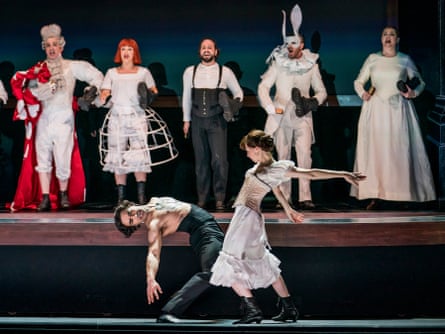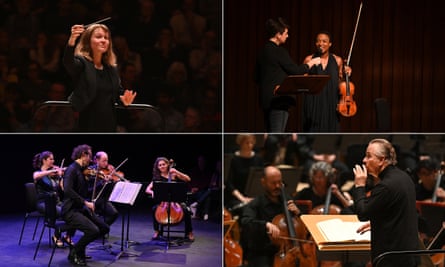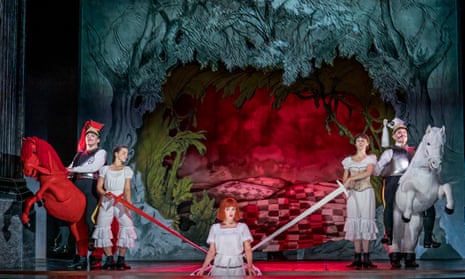Anyone who views opera as a rarefied pastime should gatecrash a schools matinee. On Monday lunchtime at the Royal Opera House, the roar in the auditorium, pre-curtain-up for Gerald Barry’s Alice’s Adventures Under Ground, was as raucous as any playground. The collective “ooh” as the lights went down, and “aah” as the red velvet curtain came up made you wish all ROH audiences were as excitedly engaged, but on the whole they’re not year 4s (eight- and nine-year-olds). Schools, or parents, paid £7.50 per ticket, thanks to support from the Taylor Family Foundation and the Gerald and Gail Ronson Family Foundation, who surely deserve mention for their low-profile but vital philanthropy.
I was seated next to 90 children from Grays, Essex, who immediately, together with the rest of the auditorium, fell quiet at the sight of Alice (soprano Jennifer France) tumbling down, down, within a Pollock-style Victorian theatre, only to be confronted by giant-sized Drink Me bottles and Eat Me cakes. As the music raced and screeched in crazed scales and arpeggios, so Alice fought back with a mayhem of stratospherically high, ridiculous, show-off top Cs – apparently 30 of them – in the first minutes of music. Who knows what trouble Barry (b1952) got up to at his County Clare primary school.
This was the world’s first encounter with his version of Lewis Carroll’s Alice in Wonderland and Through the Looking Glass in a full staging, before its opening night last Tuesday. Given a memorable concert premiere at the Barbican in 2016, it was conducted then, as now, by Thomas Adès, Barry’s friend and advocate. The composer has compressed Carroll’s best episodes, languid in comparison, into condensed matter of the most ear-popping, eye-popping variety.
The director-designer Antony McDonald, whose previous work includes the Royal Opera’s Hansel and Gretel and The Importance of Being Earnest (also by Barry and arguably even madder), might be the only person undaunted by the challenges of this nonstop, whirlwind fantasy. Mad Hatter, Mock Turtle, Red Knight, White Knight, Red Queen, White Queen, Tweedles -dum and -dee: all whistle by, each a glimpse, gone for ever. One fabulous costume is shed, another worn, with speed and finesse. The whole event lasts barely an hour.
Barry’s Alice is a true comedy, rare in opera – once you name Rossini, Donizetti, the Puccini of Gianni Schicchi, you have to stop and think – but its humour, for adults, is based on brilliant subversion of the familiar: of Carroll, of musical styles (Wagner, Verdi, Beethoven, music hall are wittily present), of language, of foolish human behaviour. Translating Jabberwocky into doggerel Russian, French and German is sillier and funnier if you know how silly and funny the original is. To say the young audience maintained a quizzical silence – except when Robert Murray as the eloquent Messenger, among his nine other roles, engaged in some high-speed bum waggling – isn’t to suggest they weren’t attentive. They were, impressively. But as Adès has said, Barry is “in the innovative line of the great Irish artists, Joyce, Beckett, Flann O’Brien” – writers who may not have made it on to the year 4 syllabus.

However innocent their eye, they surely appreciated the magic and theatricality of this staging, and certainly roared approval when the end arrived. France’s Alice, Nicky Spence’s captivating White Rabbit, Alan Ewing’s melancholic Humpty Dumpty, with Allison Cook, Carole Wilson and Stephen Richardson, were nimble and heroic in the first of two casts. The Royal Opera orchestra, brass especially, entered Barry’s zany musical world with wildness and velocity. Adès kept all, including the important silences, under military control, right until the melancholy end. The following night, the other cast, led by Claudia Boyle as Alice, and pulling with equal weight, stirred plenty of chuckles from the adult audience, but this time the children present, prompted by the grownups’ example, realised they were allowed to laugh, and did.
Humpty Dumpty’s forlorn intoning of the Ode to Joy, sung to Carroll’s words “In winter when the fields are white, I sing this song for your delight”, is one of Barry’s many and loving tributes to Beethoven. You only have to recall Beethoven’s own musical jokes to imagine how he would have enjoyed the later composer’s irony: try the cartoon extremes of variation 13 of the Diabelli Variations as a start. Beethoven blamed his seeming curmudgeonliness on his growing deafness, already fully in evidence by the age of 30, the time of his Symphony No 2. An example of one of his ear trumpets, a grotesque, cumbersome metal contraption – on show at the Barbican as part of a touring exhibition from the Beethoven-Haus in Bonn – must haunt any mind or imagination. Yet Symphony No 2 bursts with optimism and radiance, as the City of Birmingham Symphony Orchestra, under their music director Mirga Gražinytė-Tyla, demonstrated so vigorously at the Barbican’s Beethoven Weekender.

This coming together of the UK’s regional orchestras – never before under one roof, as far as anyone could recall – was an inspired celebration of Beethoven in his 250th birthday year. It’s impossible to convey every aspect of a full two days that ranged from a soft play Baby Beethoven Squish Space to recorded birdsong in the Barbican Conservatory, as well as all nine symphonies. As fringe activities, repeated through the sold-out weekend (a bargain £45 all-in), Simon Callow read the composer’s letters with the excellent Carducci Quartet performing; Gerard McBurney introduced the often witty gems that are Beethoven’s piano Bagatelles, with pianist Christopher Park; and Sarah Mohr-Pietsch shared the awe-inspiring secrets of Beethoven’s own, honey-toned violin, played by Daniel Sepec, with Tai Murray performing, in contrast, on a modern violin.
The Royal Liverpool Philharmonic Orchestra launched the weekend proper, under their chief conductor Vasily Petrenko, with elegant, nuanced accounts of Symphonies 5 and 6, and some remarkable pianissimo string playing. Then the Bournemouth Symphony Orchestra, with Kirill Karabits, uncorked the fizzing energy of No 1 and the contrasting sobriety and wit, turbulence and anarchy of No 3 “Eroica”. On Saturday evening, to end the day, and without worrying about any numerical harness, the CBSO paired the two least familiar symphonies, Nos 2 and 4: check out their electrifying performance of these works (from Birmingham), now on BBC Sounds.
On Sunday, the smaller forces of the Royal Northern Sinfonia – an orchestra I don’t know as well as I should – made light of Beethoven’s own beloved, the Eighth, and stormed through the terrors of No 7. Their conductor, Lars Vogt, also a star pianist who has directed the concertos from the keyboard, has a way of giving modest gestures, a curve of the hand, a slight bend of the knees, yet eliciting quickfire results. No wonder this wonderful ensemble got such particular cheers after the hair-raising finale of the Seventh.

Lastly came the Hallé Orchestra, conducted by Mark Elder, who brought wisdom and magnificence to the Ninth, with an accomplished quartet of soloists and the Hallé Choir, without scores, singing the Ode to Joy with belting fervour. Many of us were there all weekend. The ovation was, in part, for the Ninth, for its invention and ingenuity, as well as for its wider associations and resonances. Chiefly, the long applause was for the whole event, and the limitless, humanistic genius of Beethoven.
Star ratings (out of five)
Alice’s Adventures Under Ground ★★★★★
Beethoven Weekender ★★★★★
Alice’s Adventures Under Ground is at the Royal Opera House, London, until 9 February

Comments (…)
Sign in or create your Guardian account to join the discussion